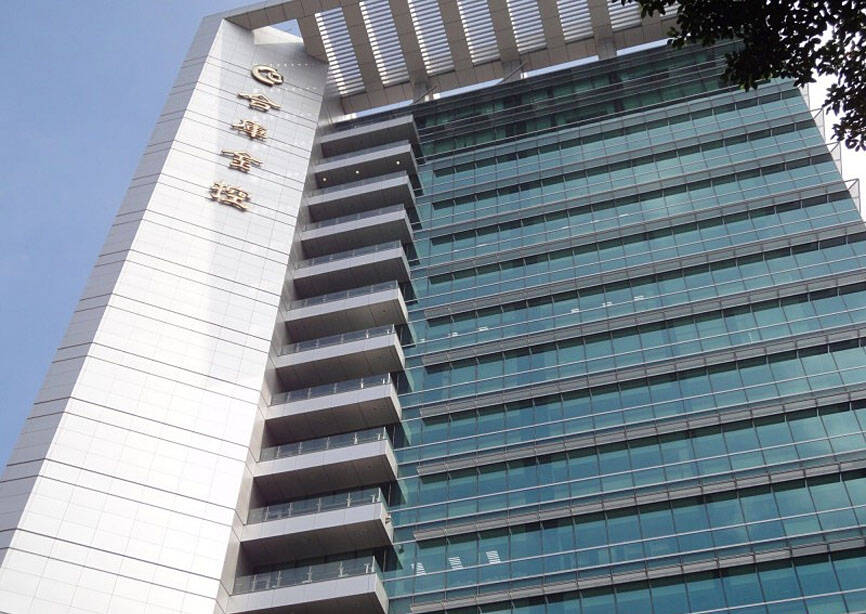State-run Taiwan Cooperative Financial Holding Co (合庫金控) yesterday said that it is looking at stable profit growth this year, as the improving economy at home and abroad would benefit core businesses and reverse loss-making overseas operations.
The bank-focused conglomerate gave the guidance during an online investors’ conference and said that economic scenes appear less murky, limiting the need for provisions.
Taiwan’s GDP growth this year is predicted to rise more than 3 percent, much faster than last year’s 1.32 percent.

Photo: Chen Mei-ying, Taipei Times
Net income last year totaled NT$17.88 billion (US$558.92 million), or earnings of NT$1.17 per share, company data showed.
The results represented declines of 14.12 percent and 15.22 percent from their levels in 2022, mainly due to provision costs for operations in Cambodia and elsewhere, Taiwan Cooperative Financial president Chen Mei-tsu (陳美足) said.
“Cambodia emerged from the pandemic in a slower-than-expected fashion,” prompting the lender to raise provision costs in the second and third quarters of last year to shore up its capital strength, officials said.
Things started to stabilize in the fourth quarter, when overseas operations squeezed a tiny profit, they said.
A string of rate hikes by the US Federal Reserve also pushed up funding costs more rapidly than the rise in interest income, officials added.
That explains why its main subsidiary, Taiwan Cooperative Bank (合作金庫銀行), last year saw its net income fall 14.95 percent to NT$16.3 billion, despite trading gains from financial products — including foreign exchange swaps — soaring nearly 200 percent.
Foreign exchange swaps generated more than NT$9 billion in profit, but might drop to NT$7.5 billion this year, they said.
This is due to Taiwan’s central bank last week unexpectedly raising interest rates by 0.125 percentage points and given that the US Federal Reserve might lower rates to support the US economy, officials added.
The narrowing difference between the interest rates of Taiwan and the US is unfavorable for swap revenue, officials said.
Even without the provision costs, Taiwan Cooperative Financial would record a net income increase of almost 20 percent, indicating that core businesses remain healthy, Chen said.
High funding costs also affected the results of Taiwan Cooperative Securities Co Ltd (合庫證券) and Taiwan Cooperative Bills Finance Corp (合庫票券), officials said.
In contrast, its venture capital and life insurance units saw robust improvement in their earnings ability, they added.
Taiwan Cooperative Financial said it plans to distribute a cash dividend of NT$0.65 per share and another stock dividend of NT$0.35 from last year’s net income, suggesting a payout ratio of 85 percent.
The plan is still pending approval from a shareholders’ meeting later this year.

In a small town in Paraguay, a showdown is brewing between traditional producers of yerba mate, a bitter herbal tea popular across South America, and miners of a shinier treasure: gold. A rush for the precious metal is pitting mate growers and indigenous groups against the expanding operations of small-scale miners who, until recently, were their neighbors, not nemeses. “They [the miners] have destroyed everything... The canals, springs, swamps,” said Vidal Britez, president of the Yerba Mate Producers’ Association of the town of Paso Yobai, about 210km east of capital Asuncion. “You can see the pollution from the dead fish.

SELL-OFF: Investors expect tariff-driven volatility as the local boarse reopens today, while analysts say government support and solid fundamentals would steady sentiment Local investors are bracing for a sharp market downturn today as the nation’s financial markets resume trading following a two-day closure for national holidays before the weekend, with sentiment rattled by US President Donald Trump’s sweeping tariff announcement. Trump’s unveiling of new “reciprocal tariffs” on Wednesday triggered a sell-off in global markets, with the FTSE Taiwan Index Futures — a benchmark for Taiwanese equities traded in Singapore — tumbling 9.2 percent over the past two sessions. Meanwhile, the American depositary receipts (ADRs) of Taiwan Semiconductor Manufacturing Co (TSMC, 台積電), the most heavily weighted stock on the TAIEX, plunged 13.8 percent in

A wave of stop-loss selling and panic selling hit Taiwan's stock market at its opening today, with the weighted index plunging 2,086 points — a drop of more than 9.7 percent — marking the largest intraday point and percentage loss on record. The index bottomed out at 19,212.02, while futures were locked limit-down, with more than 1,000 stocks hitting their daily drop limit. Three heavyweight stocks — Taiwan Semiconductor Manufacturing Co (TSMC, 台積電), Hon Hai Precision Industry Co (Foxconn, 鴻海精密) and MediaTek (聯發科) — hit their limit-down prices as soon as the market opened, falling to NT$848 (US$25.54), NT$138.5 and NT$1,295 respectively. TSMC's

ASML Holding NV, the sole producer of the most advanced machines used in semiconductor manufacturing, said geopolitical tensions are harming innovation a day after US President Donald Trump levied massive tariffs that promise to disrupt trade flows across the entire world. “Our industry has been built basically on the ability of people to work together, to innovate together,” ASML chief executive officer Christophe Fouquet said in a recorded message at a Thursday industry event in the Netherlands. Export controls and increasing geopolitical tensions challenge that collaboration, he said, without specifically addressing the new US tariffs. Tech executives in the EU, which is